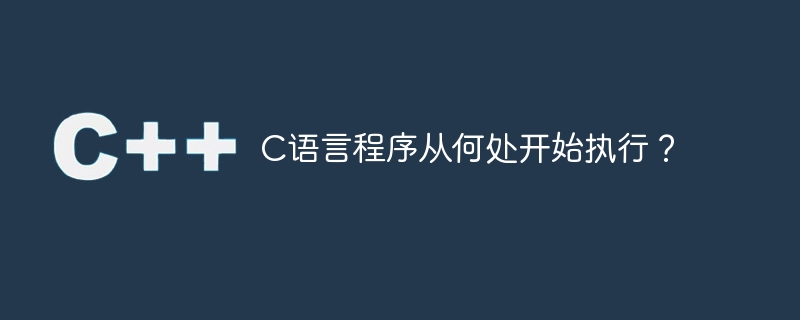Home >Backend Development >C++ >Where is the starting point of C language program execution?
Where is the starting point of C language program execution?
- WBOYWBOYWBOYWBOYWBOYWBOYWBOYWBOYWBOYWBOYWBOYWBOYWBOriginal
- 2024-02-19 21:17:06868browse

Where does the C language program start executing?
C language is a high-level language widely used in computer programming. When writing C language programs, we often consider where the program starts execution. The answer to this question is not complicated, but it is very important for beginners to understand the execution order of the program.
In a C language program, the starting point of program execution is the main() function. main()The function is the entry function of the C language program, and all codes are executed from here. The flow of C language program execution is usually as follows:
- Preprocessing stage: During the compilation process, the C preprocessor will process preprocessing instructions starting with
#. For example,#includewill insert the contents of the header file into the program, and#defineis used to define macros. - Compilation stage: The C compiler will compile the preprocessed source code to generate the corresponding object file. The compiler checks for syntax errors and generates executable code.
- Linking phase: The linker will merge all object files and library files into an executable file. The linker handles things like function references and symbol tables.
- Execution phase: Once the executable file is generated, the computer can run the program. The execution of the program starts from the
main()function. When the program starts, the operating system calls themain()function and passes the command line parameters to it.
main()The definition of a function must follow a specific format: it has no parameters or two parameters. One of the parameters is an integer type, used to represent the number of command line parameters; the other parameter is an array of character pointers, each element represents a command line parameter. main()The return type of the function must be an integer type, which is usually used to represent the execution status of the program.
Inside the main() function, we can write the main logic of the program. This can include the declaration and initialization of variables, function calls and control flow statements, etc. The program will be executed line by line in the order in which the code is written until it encounters the return statement or the program ends. When the main() function is executed, the entire program ends.
In addition to the starting main() function, there are other functions in C language that can be created and called. These functions can be used to implement different functions of the program and improve the reusability and maintainability of the code. When the program executes a function call statement, the control of the program will be transferred to the called function for execution. When the called function completes execution, control is returned to the next statement of the calling function.
During the execution of the program, the C language also provides some control flow statements to change the execution order of the program. For example, conditional statements and loop statements can choose to execute different blocks of code or repeatedly execute a certain piece of code multiple times based on different conditions. The use of these statements can help us write more flexible and efficient programs.
To summarize, the C language program starts execution from the main() function. The main logic of the program can be written inside the main() function, including declaration and initialization of variables, function calls and control flow statements, etc. Understanding the execution sequence of the program is very important for learning and using C language. I hope readers can have a clearer understanding of the execution process of C language programs through this article.
The above is the detailed content of Where is the starting point of C language program execution?. For more information, please follow other related articles on the PHP Chinese website!
Related articles
See more- Does C language program always start execution from the first defined function?
- It's scary to think about it, plug in the USB flash drive and start executing the Python code
- Java public static void main(String args) Java public static void main function (String parameter)
- Will the main function of go language wait?

